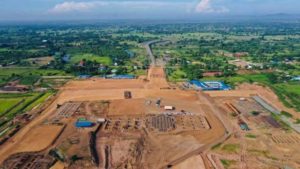
Cambodia and Thailand agree to open new border point, the Stung Bot-Ban Nong Ian border checkpoint
New border crossing to link Cambodia’s Stung Bot village in Poipet town with Ban Nong Ian village in the Thai province of Sa Kaeo
Cambodia and Thailand have agreed to open a new border crossing soon, linking Stung Bot village in Poipet town with Ban Nong Ian village of the Thai province of Sa Kaeo, in the hopes of encouraging cross-border trade.
Thai Minister of Commerce Jurin Laksanawisit on September 29 confirmed that Thailand had agreed to open the crossing ahead of schedule, even though construction on its checkpoint remains unfinished, local media The Nation Thailand reported.
He said, however, that the border gate would be open exclusively for container trade for the time being.
Cambodian Ministry of Public Works and Transport spokesman Vasim Sorya told The Post on September 30 that the move came at the request of the ministry in June, in coordination with the provincial governors of Banteay Meanchey and Thailand’s Sa Kaeo.
The ministry has been preparing the infrastructure, including roads, car parks, offices and checkpoints for the crossing. The opening will allow container lorries an alternative to the Poipet International Border Checkpoint to enter Thailand, with inspection conducted by the Cambodian side.
“We have already set up the Stung Bot immigration office. As for the customs department, we will bring officials from the Poipet border because we’ve already set up the scanning devices at Stung Bot Square,” Sorya said.
He said he did not know about the timeframe for the restricted opening, hinting at Covid-related delays and adding that the Thai side is also preparing for the new set of officials of the incoming Sa Kaeo provincial administration to formally take office.
“But we are ready for the limited opening.”
He said the initiative aims to facilitate the transit of goods across the border in both directions and to relieve congestion at the Poipet border.
“We want to open the new international border checkpoint to meet broader standards based on the principles of the ASEAN Community, the Greater Mekong Subregion.
“Of note, Cambodia and Thailand have agreed to this, to smooth the cross-border flow of goods and logistics management, and thereby lower shipping costs. We’ve also settled on a one-stop inspection system,” Sorya said.
According to the Minister of Public Works and Transport Sun Chanthol, the construction of the buildings at Stung Bot-Ban Nong Ian International Border Checkpoint will cost $26.85 million, financed by a loan from the Neighbouring Countries Economic Development Cooperation Agency (Neda), Thailand’s international development aid agency.
Cambodia Logistics Association (CLA) president Sin Chanthy welcomed the decision, chalking it up as a win for the transport and logistics sectors of both kingdoms.
“Once the checkpoint is opened, the transportation of goods at the Poipet border checkpoint will be an easier undertaking, in contrast with its historical patterns of congestion.
“At the Poipet checkpoint, both passengers and goods pass through the same road, which creates bottlenecks. Now that the Stung Bot-Ban Nong Ian checkpoint will be open at limited capacity, we’ll see better, faster transportation and shipping connections, which will save us more time,” Chanthy said.
The checkpoint is in Phsar Kandal commune’s Stung Bot village on the Cambodian side, and in Tha Kham sub-district’s Ban Nong Ian village of Sa Kaeo’s Aranyaprathet district at the terminus of Highway 3366 on the Thai side (GPS Coordinates: 13.616N, 102.61E).
Trade volume between Cambodia and Thailand reached $7.236 billion in 2020, down by 23.17 per cent from 2019, due to Covid-related disruptions, according to the Thai Ministry of Commerce.
Statistics show that Cambodia exported $1.148 billion worth of goods to Thailand in 2020, down by 49.49 per cent from the previous year, and imported $6.089 billion, down by 14.80 per cent from 2019.
These numbers imply that the Cambodia’s trade deficit with Thailand widened 8.9 per cent over the year, from $4.54 billion to $4.94 billion.
Source: https://www.phnompenhpost.com/business/cambodia-thailand-agree-open-new-border-point


